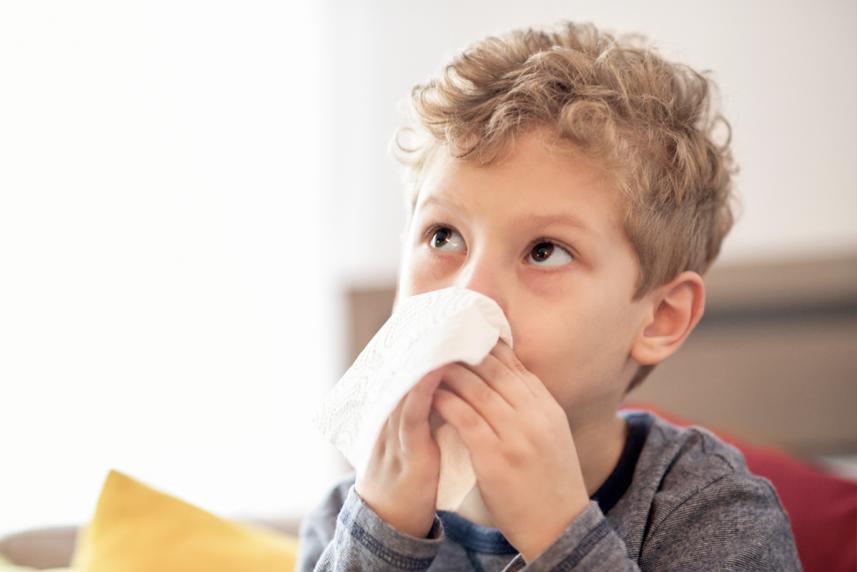
Get free coupons from Optum Perks — accepted at pharmacies nationwide.
Get ready to take a deep dive into what causes different types of allergies — and what you can do to feel better.


Get ready to take a deep dive into what causes different types of allergies — and what you can do to feel better.
Maybe you measure the seasons by your sneezes. Or maybe you’ve eaten peanuts your whole life without issue, but now they make your throat itch. You can thank allergies for both.
It can be easy to dismiss some symptoms as “just” allergies. But even so-called minor problems, such as congestion and itchy eyes, can make your life more challenging. Plus, certain allergy symptoms can be life-threatening. No matter what they are, it’s important to take those signs seriously. There are great treatments available to help you feel better.
The first step? Learn everything you can about what you’re dealing with.
There’s nothing inherently dangerous about pollen or milk. But some people’s bodies mistake these substances as a threat. Their immune system goes on the attack to try to get rid of those harmless invaders (allergens). Allergy symptoms are the result.
Allergens can include:
When you’re exposed to an allergen, your body sets off a chain of events, says Irene Paek, MD. She’s an allergist and immunologist at ProHEALTH Care Associates, part of Optum, in Bethpage, New York.
Step 1: Your body overreacts and releases a chemical called histamine.1
Step 2: Histamine kicks off different processes within your body to deal with the threat.1 It can fire up your nerves and create itching. It might also lead to a runny nose.
Step 3: You react to the histamine. If you feel itchy, you may physically brush the allergen off your skin. Maybe your runny nose causes you to grab a tissue. Blowing your nose helps flush allergens from your system.
You can think of the allergic response as one big exaggeration. The body is trying its hardest to protect itself from something that isn’t a danger.

Get free coupons from Optum Perks — accepted at pharmacies nationwide.
There is a wide range of substances that might cause allergy symptoms. They typically fall into one of several categories.
Seasonal and outdoor allergens. These happen when plants begin sprouting and pollinating. Different plants can cause allergy symptoms, depending on the season. Common examples include pollen from:2
Foods. Even a small amount of a food allergen can cause a severe reaction. “A peanut allergy is the most pervasive food allergy,” says Robert Corriel, MD. He’s an allergist at ProHEALTH Lake Success Allergy, part of Optum, in New Hyde Park, New York. “It sticks around longest.” The most common food allergens are:2
Stinging insects. Getting stung by a bee doesn’t feel good for anyone. But stings can be dangerous for people who are allergic to the insect’s venom. Examples of stinging insects include:3
Indoor allergens. If you have allergy symptoms indoors, especially in a home, they may be caused by substances such as:4
Medications.5 All medications have the potential to cause side effects. But for some people, medications may cause an allergic reaction. Some people are even allergic to certain dyes in medications. “You can have allergic reactions to just about any medication on the planet,” Dr. Corriel says.
If you think you’re having an allergic reaction to your medicine, contact your doctor right away. If you’re having severe symptoms, such as trouble breathing, call 911.
Things you touch. When allergens affect your skin, you may have rashes, hives and/or itching. Plants are common culprits, such as poison ivy. Other common allergens in this category include:
Have allergies that are mostly skin-related? Your doctor may suggest certain creams and ointments to ease itchiness and redness. In more severe cases, they may give you medication.
There does appear to be a family link when it comes to allergies. Parents with allergies are more likely to have children with allergies, Dr. Paek says.
That’s why an allergist will ask about your family history as part of your first exam. If multiple people in your family have allergies, you might get them, too. (Read more about allergies in kids.)
Allergies can start at any age. You may start to have allergies when you’re older, even if you’ve never had a problem in the past, says Dr. Corriel. You may have eaten shrimp your whole life, but it could start causing intense reactions seemingly out of the blue.
Seasonal allergies may be especially problematic, Dr. Corriel adds. Pollen seasons are getting longer and stronger due to climate change. As a result, symptoms may worsen.
The good news? You’re not always stuck with allergies once you have them.
“For the most part, allergies tend to wax and wane through life,” he says. “You can outgrow an allergy from childhood. Or you might need treatment as a child and then not as a young adult, even if you still have the allergy.”
The most common allergy test is done on a small patch of skin, usually on your arm, Dr. Paek says. A doctor will put a small amount of an allergen on your skin. About 15 minutes later, they will check your skin. (Looking for a doctor near you? Search Optum providers now.)
“If you have an allergy to something, you’ll have an allergic response,” Dr. Paek says. “You’ll have a small, itchy bump where the test was placed.”
Blood work can also find specific allergies.2 When your body finds an allergen, it makes a chemical called an antibody. Each antibody is specific to a single allergen. For example, you can be allergic to several kinds of pollen. Your body will create an antibody for each one. A blood test can find these antibodies and their levels in your blood.
Symptoms of seasonal and indoor allergies can range from slight to severe. The most common symptoms are:
Antihistamine medication is the main remedy for these symptoms. You can buy these medications over the counter at your local pharmacy or get a prescription from your doctor. Common medications include:
How do you combat dust, mold or insect droppings that cause your allergies? You may need a thorough cleaning of your home to help stop symptoms. (Stuffy nose? How to tell if it’s a cold, allergies or COVID.)
Luckily, there are ways to stop allergy symptoms before they begin. Some of these tips might keep your symptoms from happening entirely.
For more health tips you can trust delivered straight to your inbox, sign up for our health and wellness newsletter.
Food allergies can cause symptoms far beyond your stomach. Your skin, heart, lungs and airways can also be affected by eating an allergen.
Food allergy symptoms typically begin within two hours of eating. But most start within minutes. Symptoms can include:
Very rarely, you may have such a strong reaction to a food allergen that it results in a sudden drop in blood pressure. That’s called anaphylactic shock. It’s a life-threatening reaction.8 It’s most common with food and drug allergies, as well as insect stings.10 Anaphylactic shock is marked by:
If you go into anaphylactic shock, you’ll likely need a shot of epinephrine. The medicine relaxes your throat muscles, making it easier to breathe.6
Some people with food allergies carry an epinephrine injector (EpiPen®) for emergencies. People allergic to stinging insects might also carry one.
Avoidance is the main way to stop food allergy symptoms, Dr. Corriel says. Your allergist may be able to help you create a plan to slowly expose you to that food over time. But the easiest and safest method is finding something else to eat, he says.
There is no cure for allergies. But if your symptoms affect your quality of life, your doctor may suggest allergy shots. They’re also known as immunotherapy. This treatment is a more involved, lengthy way to manage symptoms.
Immunotherapy exposes you slowly to an increasing amount of a specific allergen through injections. It’s meant to “train” your body to tolerate allergens instead of reacting with severe symptoms. Your first injections take place over a period of months. Then, they’re followed by maintenance shots for several years.
Immunotherapy is typically recommended only if:
With the right plan, you can learn to manage your allergy symptoms, so that they don’t manage you.
© 2022 Optum, Inc. All rights reserved. Do not reproduce, transmit or modify any information or content on this website in any form or by any means without the express written permission of Optum.
The information featured in this site is general in nature. The site provides health information designed to complement your personal health management. It does not provide medical advice or health services and is not meant to replace professional advice or imply coverage of specific clinical services or products. The inclusion of links to other web sites does not imply any endorsement of the material on such websites.
Stock photo. Posed by model.